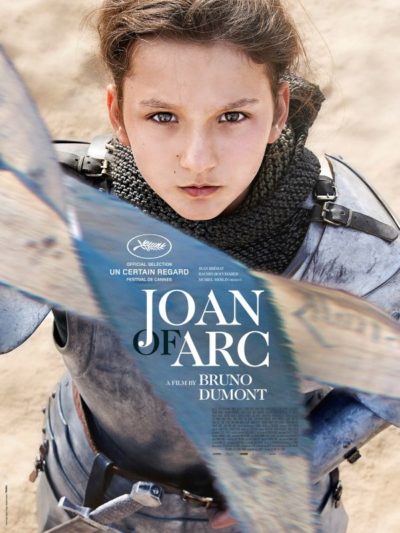★★★½
“Joan the Younger”
 I liked this considerably better than its predecessor. Part of that was, perhaps, knowing what to expect going in: a minimalist retelling, with occasional musical numbers. Except, this proved rather more than minimalist (though still very restrained), and there was hardly any singing at all. Curse you, Dumont, for confounding my expectations. It begins, much as Jeanette ended: with a lot of standing around in sand-dunes, chatting. However, the cast this time cannot be counted on the fingers of one hand, and there aren’t any staggeringly bad performances to take you out of the movie. You still don’t get any great battles. Instead, these are basically represented by team dressage, two groups of horses and riders, swirling around near each other.
I liked this considerably better than its predecessor. Part of that was, perhaps, knowing what to expect going in: a minimalist retelling, with occasional musical numbers. Except, this proved rather more than minimalist (though still very restrained), and there was hardly any singing at all. Curse you, Dumont, for confounding my expectations. It begins, much as Jeanette ended: with a lot of standing around in sand-dunes, chatting. However, the cast this time cannot be counted on the fingers of one hand, and there aren’t any staggeringly bad performances to take you out of the movie. You still don’t get any great battles. Instead, these are basically represented by team dressage, two groups of horses and riders, swirling around near each other.
But, you know what? It works, far better than you might expect. Similarly, the capture of Joan (Prudhomme) is simply portrayed by her galloping off on her horse, then cutting to her horse trotting on without a rider. Again, it gets the point over, with an elegant simplicity, befitting the understated nature here. Most of this second part is concerned with her trial for heresy, and the church’s efforts to manipulate proceedings so they could let the secular authorities do their dirty work. Yet Joan’s refusal to co-operate proves increasingly problematic to this “show trial” end. There’s a great scene where she’s being lectured by one of the prosecuting clerics, and her silence triggers increasing frustration in her interrogator.
The way Prudhomme is a far younger actress than typical also merits discussion. She was only 10 when she made this, barely half the age of Joan at her death. This certainly enhances the elements of childlike innocence throughout, and it’s hard not to feel for the little girl. Yet her spiritual backbone is made of steel, and leaves her accusers in a no-win situation. I liked the little inserts where “common people” such as her guards would discuss the topic of the trial, which again brings some much-needed humanity to proceedings. The star of the second half though, is the amazing setting of Amiens Cathedral where the trial takes place. It looks stunning, and Dumont wisely decides not to pack it with people, a decision which allows its grandeur to shine.
There’s definitely a better sense of the sacred and divine here, or at least it is generated with a higher degree of effectiveness. That seems to have been the overall focus of these two movies, albeit successful only intermittently. I did appreciate the effort to try and do something different with the concept, even if – to put it mildly! – I would not have made all of the same artistic decisions. The results unquestionably fall into the “something different” category. After being distinctly underwhelmed by the first half of the story, I felt this was a significant improvement, though it’s not a spiritual journey I think I will take again, any time soon.
Dir: Bruno Dumont
Star: Lise Leplat Prudhomme, Jean-François Causeret, Daniel Dienne, Fabien Fenet
a.k.a. Jeanne




